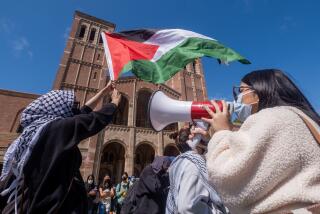Verbal Skirmish Over War : Debate: Eight ninth-graders, split between backers and critics of U.S. actions in the gulf, make strong arguments over such issues as economic sanctions and press restrictions.
- Share via
During an in-school debate Monday on the Persian Gulf War, ninth-grader David Gruber compared the Iraqi invasion of Kuwait to schoolboy bullying.
“If you were walking home from school one day and saw a young, small friend of yours being beaten up by a bully, and they begged you for help, wouldn’t you feel obliged to help them?” David asked.
“I would,” he said, touching off a wave of applause by his fellow students at Walter Reed Junior High School in North Hollywood.
But, responded Jason Kuppig, the student body president and one of the event’s organizers, a battle that promises to result in thousands of casualties cannot be compared to a street fight. Because of that, he said: “I don’t think the use of force could be justified.”
Thus was one of the dilemmas of war translated into simple language by students, who, nonetheless, also managed to explore the subtleties of the issues raised by the swirl of events in the Persian Gulf. Four ninth-graders who oppose the war and four who back U.S. policy flanked a 12-foot-long American flag and took turns responding to questions posed by social studies teacher Pat McHarg.
Both sides made strong arguments, winning applause from the audience of attentive students.
Reed Principal Larry Tash said the event was planned to provide an alternative to student walkouts that occurred at Reed during the first week of the war. “It provides them with an outlet that is constructive, educational and safe,” Tash said.
The youngsters, most of whom are enrolled in Reed’s magnet school program for gifted students, differed over the reasons for U.S. involvement in the war, over whether economic sanctions should have been given more time to work and over whether it is right for the U.S. military to limit how journalists cover the war.
The news media have “been censored so much . . . we’re not getting the whole story,” said Mosa Maxwell-Smith, one of those opposed to the use of force. The U.S. government is “going to say the bad things that happen to us so that it will build up feelings against Iraq.”
But Shayna Plaut said the U.S. military should censor coverage of the war even more strictly to deny Saddam Hussein vital information. “We know for a fact that Saddam Hussein watches CNN . . . and I saw on CNN exactly where a missile hit in Israel,” which could help the Iraqi forces target their weapons, she said.
The students did find some areas of agreement.
“I believe that the peace demonstrators are . . . being even more patriotic than the person who doesn’t take a stand either for or against,” said Elizabeth Magaletta, who favors the war and who wore a T-shirt with a caricature of Saddam Hussein aiming twin pistols at his head. “They are standing up and saying, ‘This is what I feel is best for my country,’ and although I disagree with them I salute them for that.”
She said later that “liberalism tends to be trendy” among students. “I would hope we convinced people to think about things,” Elizabeth said.
She said although she opposes war, “We have to avoid politicizing our squeamishness about blood and do what’s ideologically right.”
Jason, the student body president, was a member of the panel opposed to the war, but he also accepted the right of those who support military action to hold that position. “I don’t think these people or anyone who supports the war is a warmonger,” he said. “They just support their country and . . . think President Bush is right, but that doesn’t make them warmongers.”
Jake Campbell, an event organizer, labeled the debate a success. “We wanted to get the feelings about the war out in the open,” he said. “Instead of having to leave school, instead of protesting, we got the feelings out that were so bottled up.”
More to Read
Sign up for Essential California
The most important California stories and recommendations in your inbox every morning.
You may occasionally receive promotional content from the Los Angeles Times.













